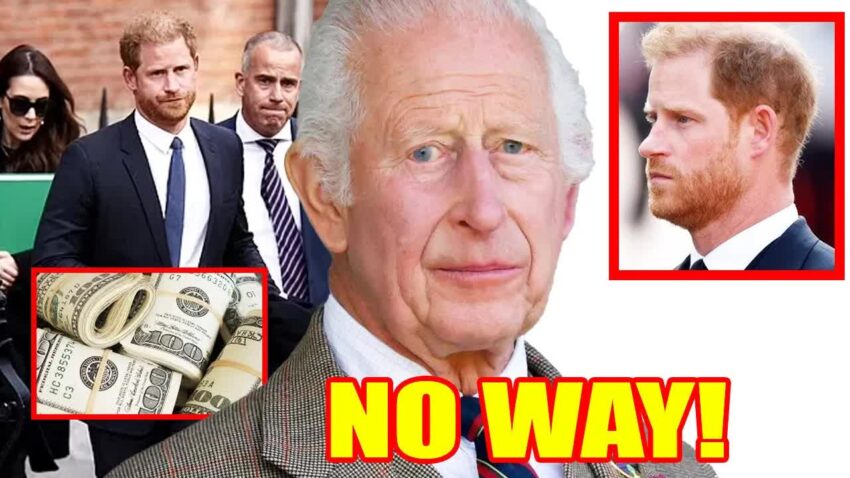Prince Harry finds himself in a precarious financial situation following a recent legal defeat that has left him with a staggering £500,000 bill.
This hefty sum stems from his unsuccessful case against the UK Home Office, and now rumors are swirling about his desperate appeal for financial assistance from his father, King Charles.
The royal family’s dynamics are under scrutiny as we delve into this latest chapter of Harry’s tumultuous journey.
Since stepping back from royal duties in 2020 alongside Meghan Markle, Harry’s transition from a beloved prince to a polarizing figure has been nothing short of dramatic.
The couple faced intense media scrutiny, especially after losing their taxpayer-funded police protection.
When Harry sought to reinstate this security, even offering to cover the costs himself, a UK judge dismissed his request, emphasizing fairness in resource allocation.
This ruling not only resulted in a significant financial blow but also raised eyebrows regarding the implications of such a decision.
The £500,000 bill encompasses both Harry’s legal fees and the British government’s defense costs, igniting public outrage over taxpayer contributions to his personal legal battles.
Many are left questioning whether Harry’s plea for help from King Charles signifies a deeper financial crisis or a strategic move to shift responsibility back onto the royal family.
The implications of this request are profound, particularly given the ongoing tensions within the royal household.
Reports indicate that Harry has reached out personally to King Charles for assistance.
However, sources close to Buckingham Palace suggest that the monarch is hesitant to comply.
This reluctance stems from concerns that supporting Harry could set a precedent for future financial demands, potentially complicating the already strained relationship between father and son.
With every controversy, King Charles is increasingly focused on safeguarding the monarchy’s dignity and reputation.
Public sentiment towards Prince Harry has shifted dramatically over the years.
Once adored, his recent actions elicit mixed feelings among British taxpayers, many of whom view his legal struggles as wasteful and self-serving.
A breakdown of the costs associated with his case reveals substantial taxpayer contributions, including nearly £100,000 for the government’s legal department alone.
Such figures have led many to question why the public should bear the financial burden of Harry’s personal disputes.
Despite the backlash, supporters argue that Harry’s concerns regarding security are valid, given the risks associated with his high-profile status.
His willingness to finance his own protection demonstrates a sense of responsibility; however, even his advocates believe his approach could have been handled more diplomatically.
The £500,000 bill represents just a fraction of the couple’s ongoing legal entanglements, raising concerns about the sustainability of their litigious lifestyle.
The UK legal system prides itself on fairness, ensuring equal access to resources for all.
Harry’s request for private police protection raises critical questions about privilege.
The judge’s ruling against him serves as a reminder that granting such requests could set a troubling precedent, potentially denying others who cannot afford similar protection.
This legal setback is not merely a personal loss for Harry; it reflects broader societal issues surrounding privilege and entitlement.
As Harry navigates the fallout from this legal defeat, he faces crucial lessons about rebuilding relationships and reassessing priorities.
Mending ties with the royal family could offer him both emotional support and financial stability.
Engaging in projects that resonate with his values rather than pursuing endless legal battles might also serve him well.
Understanding public sentiment and adopting a more humble approach could be key to regaining the trust he has lost.
This royal saga invites us to reflect on larger societal themes, including privilege and accountability.
Should Harry shoulder the full weight of his legal battles, or does the royal family have an obligation to support him?
These questions linger as the monarchy’s future hangs in the balance.
Harry’s ongoing struggles compel us to consider how personal actions impact public perception and the institution itself.
The recent legal challenges Harry has faced reveal a stark reality: stepping away from royal duties often means relinquishing financial support from the monarchy.
Living in their lavish $14.7 million mansion in Montecito, California, Harry and Meghan grapple with the high costs of maintaining their lifestyle, which includes security and travel expenses.
Critics argue that their extravagant spending habits may contribute to their financial strain.
Once seen as sympathetic figures, Harry and Meghan’s public image has shifted drastically.
Key events, such as their revealing interview with Oprah and ongoing claims of privacy violations, have tarnished their reputation.
To rebuild their credibility, they must focus on genuine causes, exhibit humility, and perhaps take a step back from the media spotlight.
As Harry’s legal battles continue to unfold, the ramifications extend beyond his personal life, affecting the monarchy as a whole.
His public complaints challenge the traditional royal ethos of maintaining silence in the face of adversity.
How the royal family responds to these challenges will undoubtedly shape its future, and many are watching closely to see if Harry can learn from his experiences and forge a new path forward.
